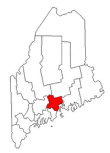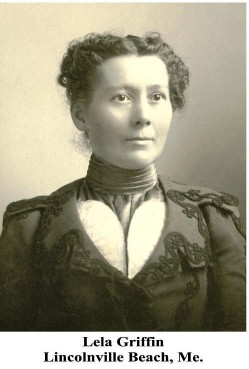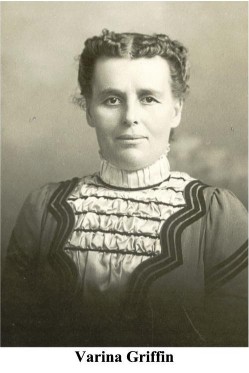Varina woke early as usual, on a
Saturday morning in 1937. She could
hear sister Lela bustling in the kitchen
below, pumping water to make coffee on the
wood-burning cook stove. The sisters
had always been early risers, as there was
so much to do on the family farm.
The rising sun caused the Bay which
she could see from her bedroom window to
shimmer like diamonds in the early dawn
light.
There were visitors to greet,
and the reporter, Henry Buxton from the Bangor
Daily News had made an appointment
to stop by, as Anne Wittemore of the Portland
Press Herald had done three years
previously.
Varina and sister Lela had been
born and raised on the farm on the
Atlantic Highway at Lincolnville Beach.
Their grandfather Elisha Griffin had
settled there in the early 1800’s. Varina
recalled hearing about Grandfather
Griffin, who with his brother, Thomas, and
another man had drowned in the cold
January waters of Penobscot Bay while
fishing between the islands in 1842.
Grandfather Elisha was forty-six
years of age when he drowned. Varina
had heard the story so often that it
seemed that she could look across the
water and visualize seeing the small boat
being caught up in a squall, causing the
men to drown in the Bay. Their
bodies had never been recovered. Another
of Elisha’s brothers, Great-uncle Otis,
had drowned in Bangor, Me. in the same
year, 1842.
Grandfather Elisha Griffin was
the son of Lt. Peleg Griffin and Lydia
Pendleton. Elisha had married grandmother,
Desier Decrow. The Pendletons had
been sea-faring men for several
generations. Great-grandfather, Lt.
Peleg Pendleton had gone to sea early in
life. He later was part-owner of the
36-ton schooner Dolphin. He
had resided in Prospect, in the part that
had become Stockton Springs, where Elisha
had been born. Many of Lt. Peleg
Pendleton’s sons had become Master
Mariners, with members of several
generations drowning in one part of the
world or another.
Varina was one of the twelve
children of Peleg Decrow Griffin and
Elizabeth Herrick of Northport. Her
father had been named after his paternal
grandfather, Peleg Decrow, who had also
been an early settler at Lincolnville
Beach. Only eight of Varina’s
immediate family had lived to adulthood,
and she and Lela were the last surviving
members of the family. They had come
from hardy New England families.
Their father, Peleg Decrow Griffin
had died in 1895 of Bright’s Disease, at
age 75 years. Mother lived on at the
farm for twenty years after his death.
Their children were Emery, Nancy
Adelia who married German Lyon, Ellis
Alexander, who died at age 32, Llewellyn
who married Alfreda Monroe, Marcellus who
married Isabelle Sarah Howe, Lela, Varina,
and the youngest, Sylvanus Griffin.
Louvica, Lucalous, Lewader and
Hollace all died in infancy.
They were all gone now,
excepting Sister Lela and Varina.
The passing of each had been
grievous, but none so much so as the death
of their youngest brother, Sylvanus.
Sylvanus was a handsome, dashing,
robust young man, beloved by all who knew
him. On Christmas day in 1897, at
the age of thirty years, he had married
Julia Katherine Lermond, known as Kate.
She had soon endeared herself to the
family. Their first child, Leonard
J. had died as an infant. The next
born was Nancy Marie, who was the joy of
the extended family. Sylvanus and Kate
later lost a daughter in 1909, Mary, who
died at birth. The elder aunts doted
on Nancy, using their sewing skills to
make clothing items, and wee doll clothing
for her delight.
Sylvanus worked in Boston and in
Rhode Island. While in R.I., he suffered
from a bout of pneumonia. Kate went
down and nursed him back to health.
They had purchased a nice home on
Eaton Ave in Camden, Me. Sylvanus’
health declined and he died on Tuesday, in
Jan. 1917, at the age of 49 years, after
suffering from Bright’s Disease, the same
illness that had taken his father.
Varina still felt the sadness of her
brother’s untimely death.
Varina finished dressing to
assist Sister Lela with breakfast and farm
chores. Lela had married George
‘Dana’ Spaulding in 1916, son of Ambrose
and Mary A. Spaulding. He was called
Dana, and was an avid hunter and trapper
of smaller animals. He loved roaming
the mountains of Lincolnville and Camden
with his dogs. Varina had never
married.
The sisters loved the farm where
they had been raised. In 1934, Anne
Wittemore of the Portland Press Herald
had written a newspaper article
calling the farm, “A Garden of Eden”,
after hearing of the many visitors to the
farm on Atlantic Highway. She wrote
of the natural rock gardens on ledges
covering over one half acre, built by hand
by the elderly Griffin sisters who had
built stone walls and stone steps up the
side of the hilled landscape to a cabin at
the top of the hill, also built by them.
The hauled loam and natural
fertilizer from their farm animals to fill
the cracks and crevices on which they
planted hundreds of varieties of
wildflowers of many kinds. They were
given flower seeds by many friends and
visitors, as well as ordering one hundred
or so packets of various flower seeds
annually. They saved their seeds
from year to year. They built series
of steps by hauling flat rocks from as far
away as the shore, which bordered on the
large field across from their home.
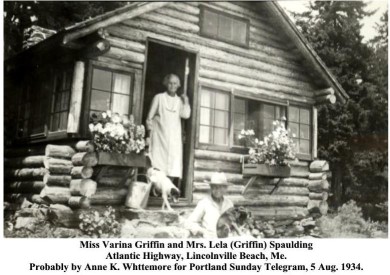
|
The sisters devised a watering
system from an old wash boiler with a hose
attached that took both of them to
operate, one to pump the water, and the
other to handle the hose. The gardens were
watered routinely. They also built a
small natural pool with a foot bridge that
was an attraction to visitors. The
flowers ran rampant over the ledges,
visible from the Highway. The
flowers were planted for their own
pleasure, from the cabin at the top of the
hill to the road. They were so
bountiful and beautiful that they wanted
to share them. They considered the
land “Good for nothing”, so continued
carrying rocks and loam to increase the
gardens each year. Their eight dogs
rambled amongst the beauty, enjoying the
visitors who continued to come. They
started keeping a visitor’s book, and had
visitors from all over America, and some
as far away as South America.
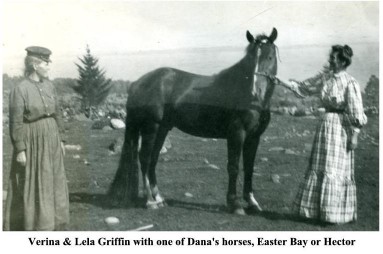
|
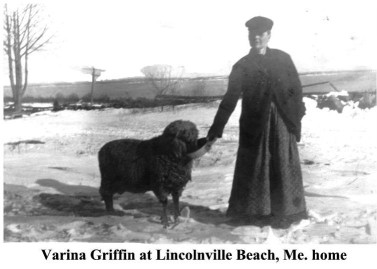
|
This morning in 1937, Henry
Buxton of the Bangor Daily News was
coming by. He was the author of many
articles as he roamed across the highways
and byways of Maine, writing of
interesting sights. He later wrote:
“Many people may find an impressive and
awe-inspiring expression of a great love
of flowers in a vast rock garden covering
a full half acre of ledges situated on US
No. 1 Highway almost on the boundary line
of Lincolnville and Camden.” He
wrote that he’d never seen two women with
more radiance of inner spirit. He
wrote that the elder women had never
allowed the aches and pains of old age to
interfere with their labor of love.
Buxton described the scene as
likened to a chapter out of Alice in
Wonderland.
Varina looked back over the
visits from two or more reporters in the
1930’s, and how she and Sister had enjoyed
reading of others enjoying the Paradise
that they had created. They stayed
on the farm until Lela’s death in 1947.
Lela is buried with her husband in
Camden. Varina passed away two years
later in a Nursing Home in Rockland, aged
85 years. Thus ended three
generations of Griffins on the farm at
Lincolnville Beach, Maine. As you
pass by the summer hillside today, with
buttercups and daisies blowing in the
breezes across the highway toward the
shoreline, one never realizes the hard
work and beauty that the hill once
portrayed.
|


